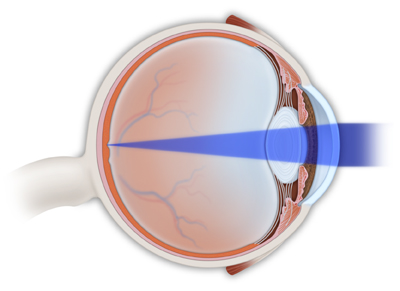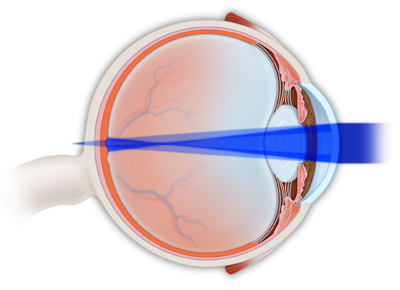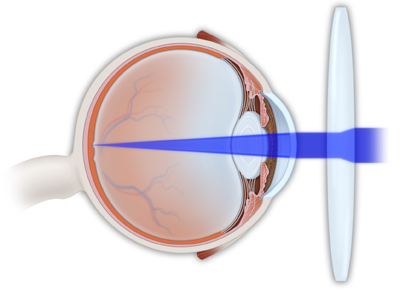Astigmatism
What Is an Astigmatism?
Astigmatism is an uneven curvature in your cornea or lens that causes blurry vision at all distances. In most cases, the curvature is in your cornea and is called corneal astigmatism. Astigmatism rarely occurs alone, and it can occur with both nearsightedness and with farsightedness. The National Eye Institute reports that two out of three (2/3) of people who are myopic or nearsighted, also have astigmatism. Fortunately, astigmatism can be corrected, usually with eye glasses or contact lenses. Some eye disorders, injuries, and eye infections can result in "irregular astigmatism", which is more difficult to correct.
The cornea is the part of the eye that helps to focus light on the retina, and works similar to the lens on a camera. Light passing through the cornea is bent and focused in a process called “refraction”. Because the shape of the cornea is not perfect, the light does not always focus perfectly on the retina. This blurring and focus distortion is known as a “refractive error”. Astigmatism is one type of refractive error.
If your cornea is almost perfectly round, it is able to focus light directly on a single spot.
However, if your cornea or lens is more oval than round, instead of focusing light on a single spot on your retina, it focuses on multiple points. This causes the blurry vision associated with astigmatism.
Most eyes aren’t perfectly shaped, and you may have a slight astigmatism that doesn’t result in perceptible blurriness. However, you may experience eye strain or headaches. At times, you may even notice mild blurriness in your vision.
When the curvature is more irregular, you will experience more significant blurriness at different distances. In some cases, this can result in more serious corneal disorders such as keratoconus.
Who Is at Risk for Astigmatism?
Most of us aren’t born with perfect eyes. Astigmatism is very common and may exist from birth. Experts believe that severe astigmatism is genetic and may be inherited. Therefore, if you’ve been diagnosed with severe astigmatism, you should have your children’s vision tested at an early age.
While the degree of astigmatism may remain consistent for some people, it can gradually become worse over time. Therefore, you should have periodic eye examinations to monitor your vision.
What Are the Symptoms of Astigmatism?
The most common symptom of astigmatism is blurry vision at all distances. This can be accompanied by eye strain or headaches. You may also notice yourself squinting or straining to try and see more clearly. If you experience these symptoms, you should schedule a comprehensive eye examination.
How Is Astigmatism Detected?
Astigmatism is detected in a comprehensive eye examination which will include:
- Visual acuity test: Measures the ability to see at all distances
- Keratometer: Measures the amount of reflected light from your cornea
- Topography: Measures the amount of distortion on the cornea surface
- Refraction: Uses a phoropter to measure vision correction using different strengths of optical lenses
How Is Astigmatism Treated?
Once astigmatism is confirmed, your eye doctor will discuss various treatment options.
The key to correcting astigmatism is to utilize a lens, either through eyeglasses or contact lenses, to properly focus light on your retina.
There are two types of contact lenses that correct astigmatism - rigid contact lenses and soft toric lenses. In addition to correcting mild to moderate astigmatism, toric lenses can also correct nearsightedness and farsightedness. However, if your astigmatism is severe, rigid contact lenses or eyeglasses may be required to correct your vision.
In addition, many patients consider LASIK Eye Surgery, the most advanced type of laser surgery used today to correct nearsightedness, farsightedness and astigmatism. Although these problems can be corrected with eyeglasses or contact lenses, some people become frustrated with relying on these optical solutions. If you are one of these people, LASIK surgery may be the right answer for you. You should discuss this option with your eye doctor if you would like to reduce or eliminate your dependence on glasses and contact lenses.
Primary Eye Care Specialists at Kadrmas Eye Care New England
Meet our optometrists who specialize in primary eye care and general eye health:



